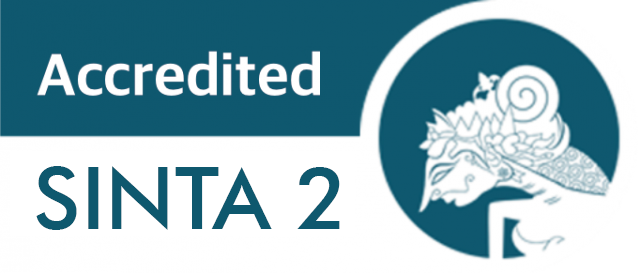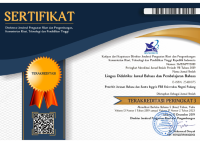Blended Learning, The International Chinese Learning Trend In Post-Pandemic Era
 ),
), (1) Shanghai International Studies University
 Corresponding Author
Corresponding Author
Copyright (c) 2022 Lingua Didaktika: Jurnal Bahasa dan Pembelajaran Bahasa
DOI : https://doi.org/10.24036/ld.v16i1.116661
Full Text:
 Language : en
Language : en
Abstract
In the early days of the Covid-19 pandemic, Chinese online learning faced many challenges, including (1) poor internet connection and high internet costs; (2) low computational literacy of teachers; (3) limited interaction between teachers and students; (4) inappropriate teaching materials and methods; and (5) the lack of student discipline and the difficulty of providing assessments. However, these challenges have turned into opportunities for the rapid development of online Chinese learning over time. Academics in China predict that online Chinese learning will be maintained in the post-pandemic era, the blended learning will become a learning trend that is applied globally. This research is descriptive qualitative research with data collection techniques through literature study method and Forum Group Discussion (FGD). The result of this study is a description of the solution to the challenges of Chinese online learning globally during the pandemic, blended learning, and its implementation strategy in the post-pandemic era based on the “Chinese Proficiency Grading Standards for International Chinese Language Education” issued in 2021.
Keywords
References
Bantuan Kuota Data Internet 2021 - Kemendikbud. (2021). Retrieved February 24, 2022, from https://kuota-belajar.kemdikbud.go.id/
Brown Wright, G. (2011). Student-Centered Learning in Higher Education. International Journal of Teaching and Learning in Higher Education, 23(3), 92–97. http://www.isetl.org/ijtlhe/
Cahyono, S. I. H., Drajati, N. A., & Ngadiso, N. (2020). Am I a Technophile? the Narrative Study of Teachers’ Belief about Digital Literacy. Lingua Didaktika: Jurnal Bahasa Dan Pembelajaran Bahasa, 14(1), 1–11. https://doi.org/10.24036/LD.V14I1.106724
China’s, & Committee, M. of E. and S. L. W. (2021). Chinese Proficiency Grading Standards for International Chinese Language Education. Beijing Language and Culture University Press.
González‐Lloret, M. (2020). Collaborative tasks for online language teaching. Foreign Language Annals, 53(2), 260–269. https://doi.org/10.1111/flan.12466
Hui, W. (2021). 新冠疫情影响下的国际中文教育: :问题与对策 [International Chinese education under the influence of the Covid-19 Epidemic: : Problems and Strategy]. Language Teaching and Linguistic Studies, 4, 11–22.
Jianming, L., Xiliang, C., Wangxi, Z., Peng, Z., Xia, L., Yanqun, Z., Liping, F., Rui, S., Meiling, H., Chuanyu, G., Haiyan, J., Tian, S., Hong, C., Chen, W., Ying, X., Jingjing, J., Yang, Z., Li, Z., Liang, B., … Xianyin, L. (2020). 新冠疫情下的汉语国际教育:挑战与对策”大家谈(下) [Teaching Chinese to Speakers of Other Languages under the Covid-19 Pandemy: Challenges and Strategy]. Language Teaching and Linguistic Studies, 5, 1–16.
Jinsheng, S., & Lufei, W. (2021). 新冠疫情背景下高校留学生线上汉语教学调查研究 [Investigation and research on online Chinese teaching for international students in colleges and universities under the background of the Covid-19]. Language Teaching and Linguistic Studies, 4, 23–33.
Juan, Y. (2021). 新冠疫情下高校教师信息素养调查与反思 [Investigation and reflection on information literacy of college teachers under the Covid-19 pandemic]. 豫章师范学院学报 Yuzhang Shifan Xueyuan Xuebao, 36(5), 76–82.
Kekang, H. (2002). E-learning 与高校教学的深化改革(上) [E-learning and the Deepening Reform of College Teaching (Part 1)]. China Educational Technology, 2, 8.
Kekang, H. (2005). 从Blending Learning看教育技术理论的新发展 [The new development of educational technology theory from the perspective of Blending Learning]. Journal of the Chinese Academy of Governance, 9, 10–18.
Lailatul Qadriani, N., Hartati, S., Dewi, A., Al, U., Indonesia, A., Sisingamangaraja, J., Masjid, K., Al Azhar, A., Baru, K., & Selatan, J. (2021). Pemanfaatan Youtube dan Edpuzzle sebagai Media Pembelajaran Daring Berbasis Video Interaktif. Jurnal Pemberdayaan Masyarakat Universitas Al Azhar Indonesia, 4(1), 1–8. https://doi.org/10.36722/JPM.V4I1.841
Moorhouse, B. L., Li, Y., & Walsh, S. (2021). E-Classroom Interactional Competencies: Mediating and Assisting Language Learning During Synchronous Online Lessons: RELC Journal, 003368822098527. https://doi.org/10.1177/0033688220985274
Qingli, T., Yingyan, G., & Yu, L. (2020). 新型冠状病毒肺炎疫情下大规模在线视频教学存在问题及对策 [Problems and strategy of large-scale online video teaching under the epidemic of new coronavirus pneumonia]. 学周刊 Xuezhou Kan (Learning Weekly Journal), 21, 173–174.
Rui, Z. (2019). 互联网时代下汉语网络教材研发初探 [A Preliminary Study on the Research and Development of Chinese Online Teaching Materials in the Internet Era]. Education Modernization, 6(25), 233–236.
Tomlinson, B., & Whittaker, C. (2013). Blended Learning in English Language Teaching: Course Design and Implementation. British Council. www.britishcouncil.org
What are the top 200 most spoken languages? | Ethnologue. (2022). 5 February 2022. https://www.ethnologue.com/guides/ethnologue200
Xiuqin, L., & Linlin, W. (2020). 关于线上国际中文教学的调查与思考 [Investigation and Reflection on Online International Chinese Teaching]. Journal of International Chinese Teaching, 4, 39–46.
Yanli, L. (2016). 混合式教学效果影响因素研究——以内蒙古民族大学文学院国外汉学研究课程为例 [Research on the Influencing Factors of Blended Learning Effect——An example of the study of foreign sinology in the Faculty of Literature, Inner Mongolia University for Nationalities]. Research On Higher Education Of Nationalities, 4(6), 70–74.
Yumeng, R. (2021). 疫情背景下对外汉语线上教学的调查与思考 [Investigation and reflection on online teaching of Chinese as a foreign language in the context of the pandemic] [Shenyang Normal University].
Yumeng, R., & Shumei, Z. (2020). 后疫情时代对外汉语教学的思考与转变 [Reflections and Transformations in Teaching Chinese as a Foreign Language in the Post-pandemic Era]. Journal of Liaoning Educational Administration Institute, 37(6), 78–82.
Yuming, L., Bing, Z., Hui, S., Yuesang, B., Lening, L., Yongyi, W., Quan, L., Xiaohong, W., Wen, C., Ying, R., Yingxia, S., Rongyan, L., & Mo, C. (2020). 新冠疫情下的汉语国际教育:挑战与对策”大家谈(上) [Teaching Chinese to Speakers of Other Languages under the COVID-19 Pandemic: Challenges and Strategies]. Language Teaching and Linguistic Studies, 4, 1–11.
 Article Metrics
Article Metrics
 Abstract Views : 625 times
Abstract Views : 625 times
 PDF Downloaded : 186 times
PDF Downloaded : 186 times
Refbacks
- There are currently no refbacks.
Copyright (c) 2022 Lingua Didaktika: Jurnal Bahasa dan Pembelajaran Bahasa

This work is licensed under a Creative Commons Attribution-NonCommercial 4.0 International License.










